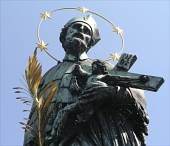
Obsah
Obsah
Portál

The Battle of Whit Mountain 1620 marks the beginning of counter-reformation and re-Catholization of the Czech lands and the beginning of the Thirty Year War. Jesuits were introduced to the land and reformed denominations were forced to exile. From 'Christianity in the Czech Lands' by Jan Royt
In 1618, the Utraquist Estates, angered at decrees closing Protestant congregations in Hroby and Broumov, broke into the Chancellery of the Czech Court in Prague Castle and hurled the hated Jaroslav Bofita of Martinice, Jáchym Slavata of Chlum and Košumberk, and his secretary Fabricio out of the window in what came to be known as the Prague Defenestration. This act sparked the beginning of the Thirty Years' War, which was to convulse the whole of Europe.
The Czech Estates deposed the Hapsburgs from the throne and drove the Jesuits from the country. They elected as their king Frederick, elector palatine, a Calvinist, but were defeated at the Battle of White Mountain near Prague in 1620. The Hapsburgs reoccupied the throne, executed rebels in Prague's Old Town Square, and declared Catholicism the state religion. Non-Catholics, including teacher and bishop of the Czech Brotherhood John Amos Comenius, were forced into exile. None of the results of the Battle of the White Mountain were changed by the 1648 Peace of Westphalia, which ended the Thirty Years' War and placed the Czech Lands in the Hapsburg sphere. The university was handed over to the returning Jesuits and renamed the Charles-Ferdinand University. Both established and newly arrived religious orders joined in the Counter-Reformation. Cults of the saints and the Virgin Mary were revived. As a votive offering for the end of the sufferings of the Thirty Years' War, a Marian column was raised in Prague on the Old Town Square, complete with a statue of the Immaculata (an iconic depiction of the Virgin Mary). Statues and pictures of medieval origin connected by legend with the glory days of Catholicism in the Czech Lands were honored, and the cult of Czech patron saints, which combined patriotism with religious fervor, thrived. Catholic piety reached its peak with the beatification (1721) and subsequent canonization (1729) of John of Nepomuk, perhaps the most familiar of Czech saints. More bishoprics were founded: In 1655 at Litoměrice, in 1664 at Hradec Králové, and later, in 1785, at České Budějovice.
A second wave of persecution of non-Catholics began after 1700 and came to a climax in 1717 with the patent of the zemský sněm (the Diet of the Land) against non-Catholics. The last remnants of the Unity of Brethren found a refuge at the estates of Count Nicholas von Zinzendorf in Saxony. He was sympathetic to their cause and granted them permission to found their own community in nearby Berthelsdorf, which they called Herrnhut (Ochranov). Through Daniel A. Jablonský, episcopal consecration was passed to the Unity of Brethren in Herrnhut, thus continuing the tradition of the Czech Brotherhood. Zinzendorf became a member of the Brethren and was later consecrated as a bishop. Under his leadership, the Unity of Brethren became an international religion. He sent missions from the Brotherhood throughout the world, to England, Greenland, Labrador, Africa, and to the American colonies, where its adherents are known as Moravians. In his concept of the Tropus, Zinzendorf developed the idea that all forms of Christianity could contribute to recreating the kingdom of God on earth, and that they would be bound together by love of the Lamb, the symbol of Christ.
